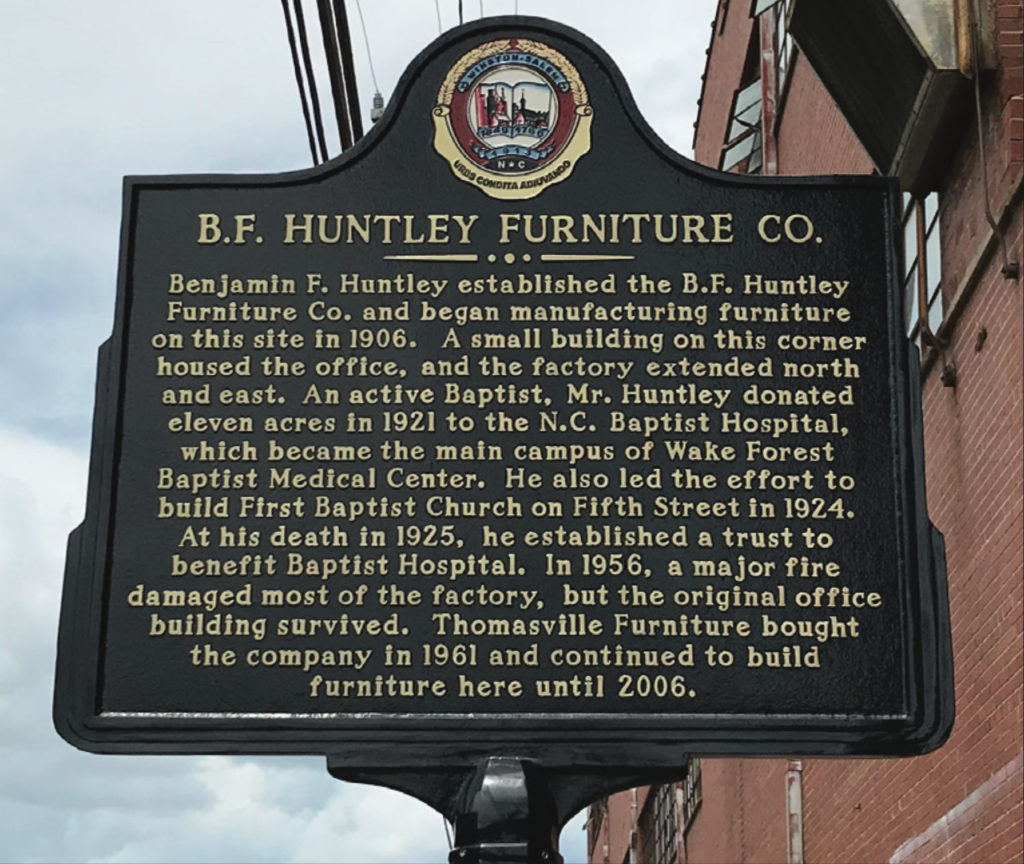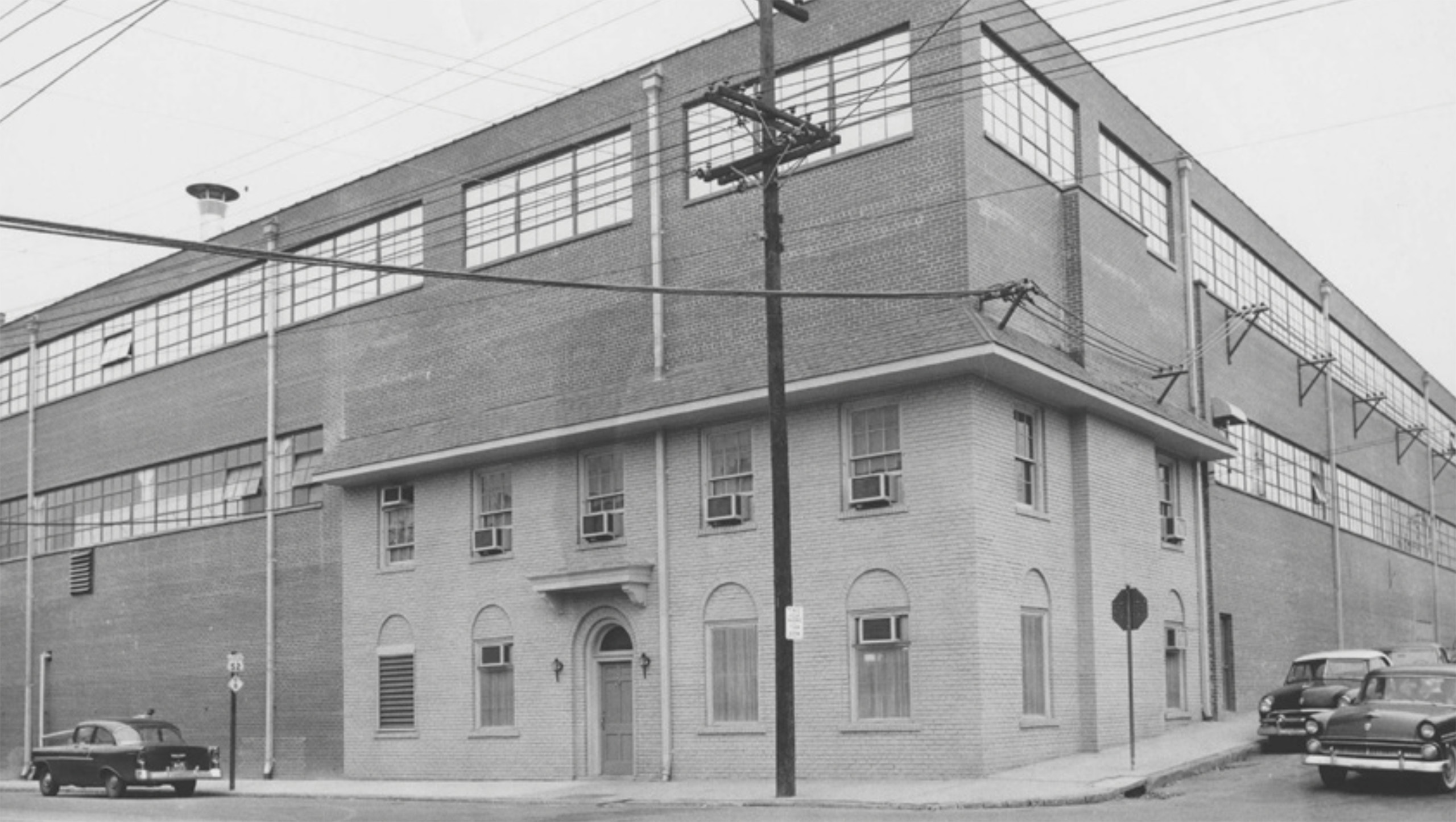This past December, the site that once served as the core of my great-grandfather’s furniture business was purchased by the Winston-Salem/Forsyth County Schools’ Board of Education and is set to become the location of the new Brunson Elementary School.
I’m excited to watch the building, which sits at 1201 Patterson Ave. in the Industry Hill neighborhood of Winston-Salem, come back to life and know that my great-grandfather, Benjamin Franklin “B.F.” Huntley, would be thrilled that the land his company purchased at the turn of the 20th century is going to be the home of a new school.
A Brief History of B.F. Huntley
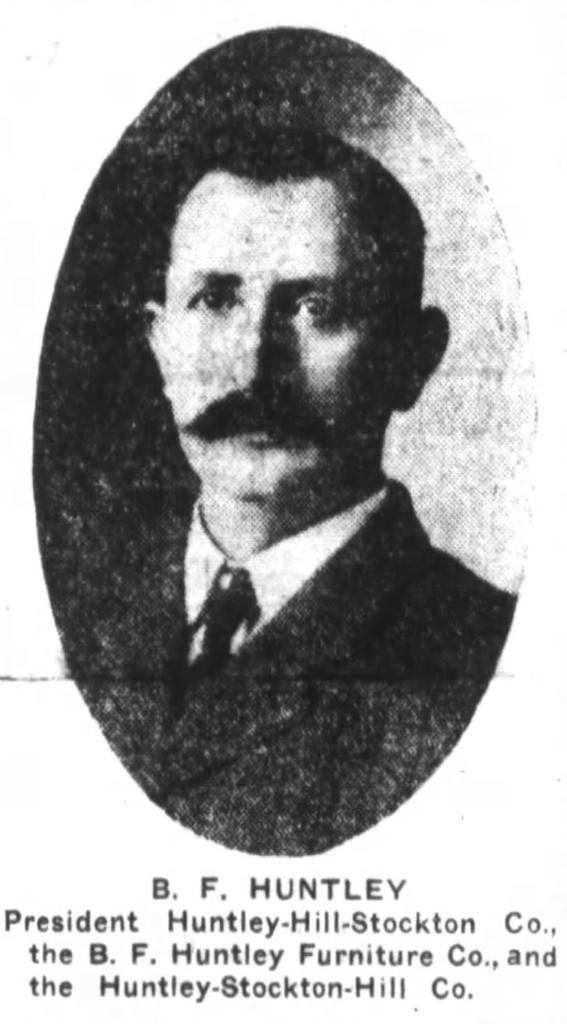 At the age of 19, my great-grandfather’s left arm was violently severed from his body in a cotton gin accident. As he was no longer capable of working on his father’s farm in South Carolina, Mr. Huntley moved north and began working as a traveling salesman for a furniture company in High-Point. From there, he went on to open a series of furniture stores—including the B.F. Huntley Furniture Company, which was founded in 1906.
At the age of 19, my great-grandfather’s left arm was violently severed from his body in a cotton gin accident. As he was no longer capable of working on his father’s farm in South Carolina, Mr. Huntley moved north and began working as a traveling salesman for a furniture company in High-Point. From there, he went on to open a series of furniture stores—including the B.F. Huntley Furniture Company, which was founded in 1906.
In the words of my grandmother, Kathleen Huntley Spencer, her father was a self-made man with a self-trained mind.
“The discipline of [losing his arm] became to him a triumph more than a defeat. His strong right arm acquired the strength and skill of two. What is of vastly greater importance is that it awoke his greatest powers to the task of mastering other difficulties and leaping clear of the stumbling stones which beset others. He had confidence in his own ability, but he also had confidence in the organization which he had created.”
With his discipline and entrepreneurial spirit, it’s no surprise that Mr. Huntley became one of only a few successful businessmen in the Twin City whose fortune wasn’t directly linked to textiles or tobacco. In its heyday, B.F. Huntley Furniture Company, which was operational until 1961, was one of the biggest furniture companies in the South and had the largest bedroom and dining room divisions in the United States.
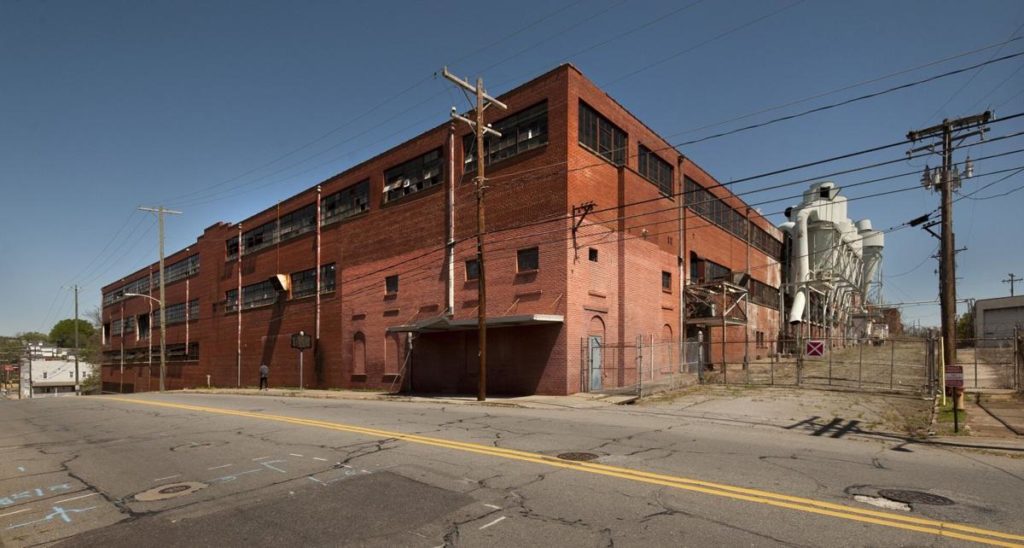
The Life, Death, and Rebirth of 1201 Patterson Ave.
The B.F. Huntley Furniture Company got its start after the Oakland Manufacturing Company (which Mr. Huntley formed alongside William P. Hill and Madison D. Stockton in 1898) bought out the Winston Furniture Company in 1906. In addition to the formation of this new enterprise, Mr. Huntley’s business also acquired the Winston Furniture Company’s property at the corner of Patterson Ave. and 12th Street. The existing facilities, which became the new home of one of B.F. Huntley Furniture Company’s factories, included multiple lumber sheds, a railroad siding, two dry kilns, a three-story brick manufacturing building, and water tanks. As the B.F. Huntley Furniture Company grew over the years, various expansions took place and the factory more than doubled its size by 1920.
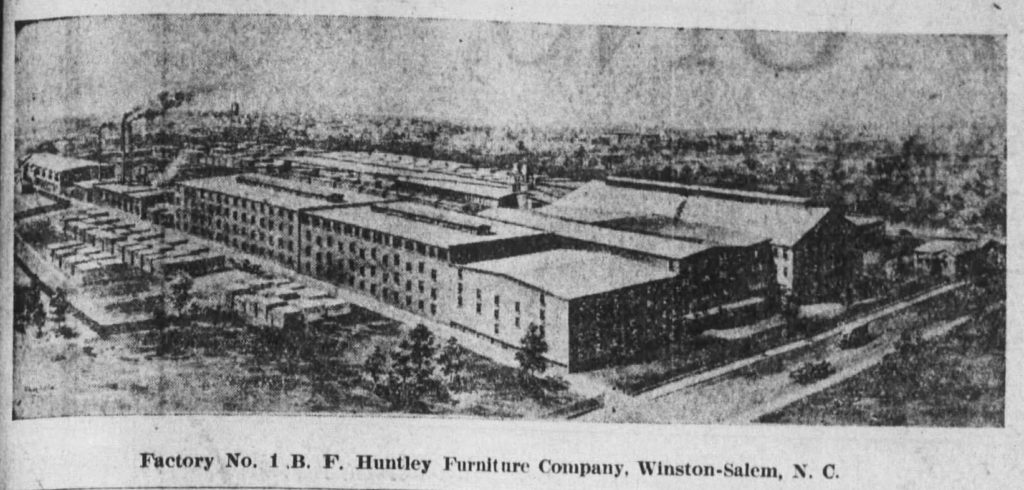
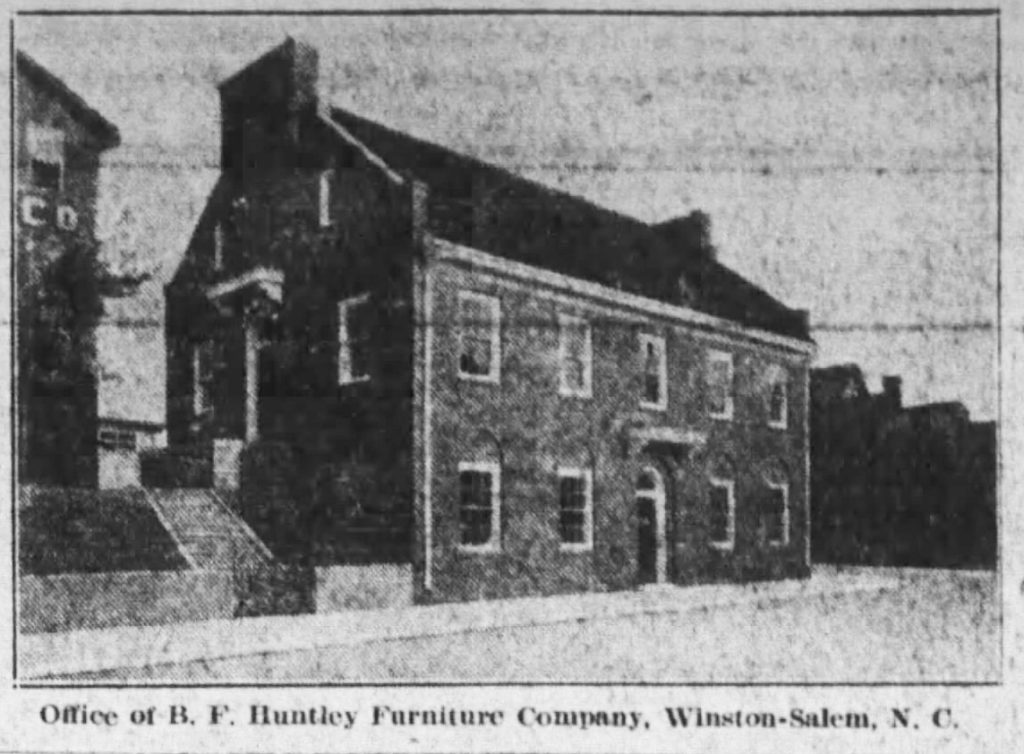
In 1921, Mr. Huntley received a permit to build a two-story office on the property. On November 14th of the same year, The Twin-City Daily Sentinel published an article that showcased the newly erected office building and B.F. Huntley Furniture Company’s downtown Winston-Salem factory.
“Plant No. 1, at which is located the office building, is at the corner of Patterson avenue and Twelfth streets. [This plant is] modern in every respect, and equipped with all the latest improved machinery for turning out high-class furniture. They have been in business 20 odd years, and when they commenced manufacturing their plant was small, but they have been gradually building ever since and adding special departments for improving their business.”
Following the death of Mr. Huntley in October of 1925, the buildings at 1201 Patterson Ave. thrived for another 30 years until a fire burned much of the factory to the ground on Valentine’s Day in 1956.
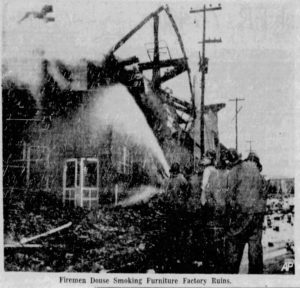
On February 14th, 1956 The Gastonia Gazette reported:
“A spectacular fire with flames shooting some 150 feet high raced through a furniture factory here today, taking at least one life. The fire was discovered about 6:30 a.m. Flames leaped quickly from building to building, most of them interconnected. Sheets of fire and dense smoke enveloped the area, about a dozen blocks north of the center of the city.”
In a loss that neared $1.5 million, the two-story office building constructed in 1921 was the only structure that survived.
The construction of a new factory began almost immediately. Its design incorporated the two-story office and was heavily inspired by the contributions Northup & O’Brien (one of the state’s most prolific architectural firms throughout the first half of the 20th century) had made to the original buildings. And even though the factory was back up and running in less than a year, the B.F. Huntley Furniture Company was nearing its end.
In 1961, Thomasville Chair Company acquired Mr. Huntley’s business and adopted Thomasville Furniture Industries as their new name. For the next 45 years, the company manufactured their products at 1201 Patterson Ave. The building has sat empty since Thomasville Furniture Industries left in 2006.
Mr. Huntley’s Passion for Education
Throughout his lifetime, Mr. Huntley remained active at his Baptist church and ultimately became a part of the group that convinced the NC Baptist Convention to place their hospital in Winston-Salem—he even donated eleven acres of land to the Convention, of which would go on to host the hospital’s main campus.
In December of 1922, Mr. Huntley became one of the first directors of North Carolina Baptist Hospitals, Inc. In the hospital’s certification of incorporation, Mr. Huntley and eleven other directors attested that a primary objective of North Carolina Baptist Hospitals would be…

Knowing that Mr. Huntley was passionate about creating a space within the hospital that would be dedicated to the education of nurses and other medical personnel, I feel confident in saying that my great-grandfather would be pleased to hear that the former site of B.F. Huntley Furniture Company’s factory is destined to become an elementary school.
While I’m looking forward to seeing the space take on a new purpose, it is my ultimate hope that the Winston-Salem/Forsyth County Schools’ Board of Education works to preserve the history of the space and my great-grandfather’s memory. I would love to see them find a creative way to incorporate the factory or the facade of the 1921 office building into their overall design.
It’s been important to me to make sure that Mr. Huntley’s contributions to our community are not forgotten—I believe it’s part of my legacy to preserve his. A few years back, I worked with the State of North Carolina to erect a historical marker at the corner of 1201 Patterson Ave. that details some of the history of the B.F. Huntley Furniture Company. I’ve also had the distinct privilege of walking in my great-grandfather’s footsteps over the past 40 years by running some of my own businesses (JKS Incorporated, The Winston Cup Museum, and Robert Hall) just a half a mile away from where the B.F. Huntley Furniture Company factory once flourished.
While progress and growth can revitalize abandoned buildings and reinvent neighborhoods, it also has a tendency to wash away the past. Here in Winston-Salem there are so many stories like Mr. Huntley’s that have been set aside or relinquished to our history books. In order to keep growing, we must remember that had it not been for industrious entrepreneurs like Mr. Huntley, we wouldn’t have a city to build upon.
